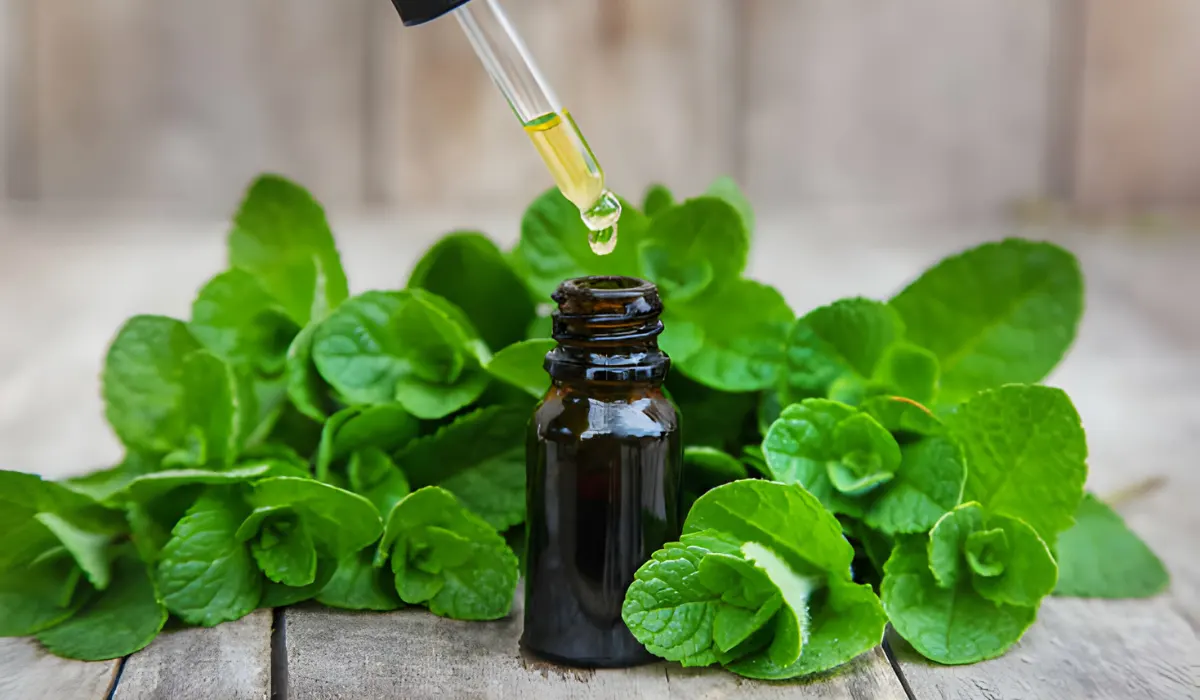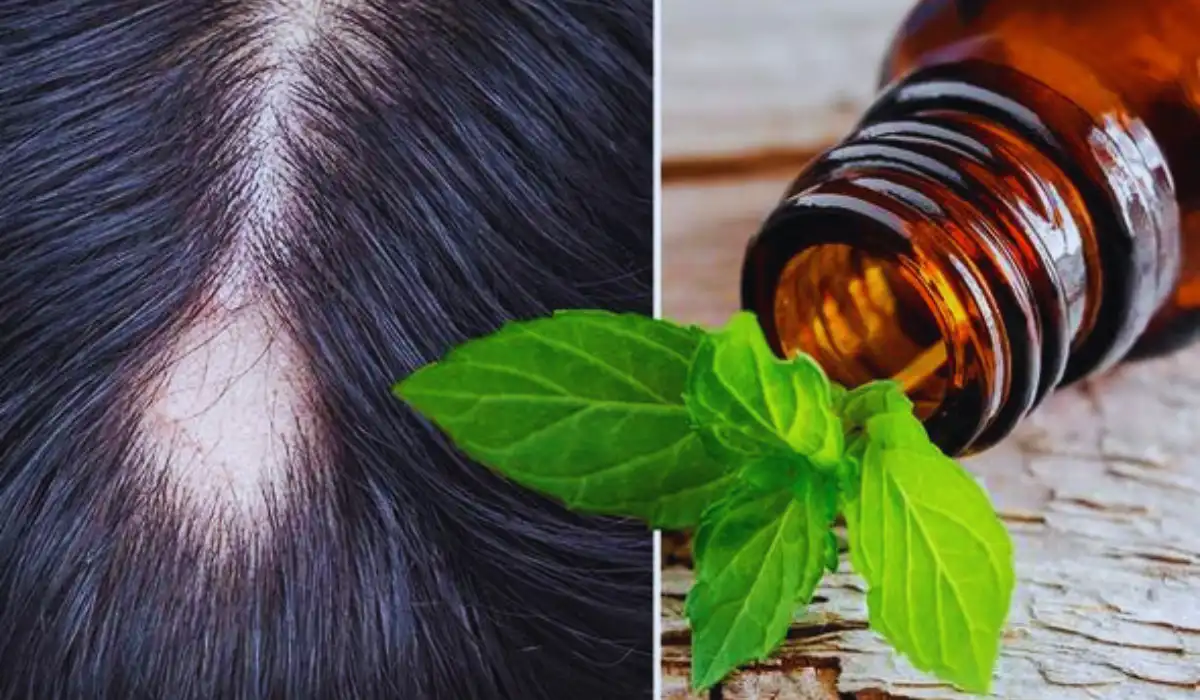Hair loss is a common problem these days both in males and females. Besides the chemical treatments, natural ingredients have also shown remarkable relief from hair loss. In this context, peppermint oil has been extensively used as a popular hair fall remedy.
You might have heard of peppermint oil – it’s one of the most widely used essential oils that has been a part of traditional medicines for centuries. Recent studies have uncovered that Peppermint has antibacterial and antimicrobial properties and is beneficial for several ailments including digestive disorders, respiratory issues, and headaches.
However, does it offer similar relief for hair fall? Is peppermint oil good for hair loss? Let’s try to find the answer and explore the various other benefits of peppermint oil for hair.
Is Peppermint Oil Good For Hair Loss?

Yes, Peppermint oil has proven to be beneficial for hair loss. According to a study published on PubMed Central, peppermint oil has been shown to promote hair growth without showing any toxic signs. The study found a significant increase in dermal thickness, follicle depth, and follicle thickness. Besides, peppermint oil is more effective than minoxidil, a hair growth drug approved by the FDA in the United States.
How Does Peppermint Oil Prevent Hair Fall? Benefits Explained
Peppermint oil primarily includes menthone, menthol, acetate, coumarins, and neomenthol. These compounds offer several hair protective properties that enable peppermint to prevent hair loss. Let’s understand how;
- Boost Blood Circulation
The Menthol in peppermint oil is known to have vasodilatory effects that improve blood flow to the scalp. The enhanced blood flow ensures better oxygenation and increased nutrient delivery to the hair scalps. It enhances hair follicles’ health and prevents Hair Fall.
- Strengthen Hair Roots
One of the primary reasons for hair fall is weakening roots. It could be due to infections stemming from improper care of the hair. Peppermint oil possesses strong antimicrobial properties which helps clean and healthy hair scalps. Likewise, it also ensures proper microbial balance in the hair and strengthens hair roots thus preventing hair fall.
- Fight off Dandruff
Dandruff (fungal infection of hair scalp) is known to be a common cause of Hair Fall. Peppermint oil is rich in methanol which possesses strong antifungal properties. Regular use of Peppermint oil helps prevent dandruff overgrowth which in turn offers a healthier environment for scalps to grow strong.
- Balances Sebum Production
Peppermint oil was also found to balance sebum production in the scalp. Sebum is a natural oil produced by sebaceous glands. Excess sebum could make your hair look greasy and may clog hair follicles making them prone to breakage. By regulating the production of sebum, peppermint oil ensures healthy hair follicle growth and reduces hair fall.
- Reduces Inflammation
Peppermint oil is well-known for its anti-inflammatory properties. It can soothe inflamed scalp which is crucial for healthy growth of hair. Reduced inflammation leads to proper growth of hair follicles and makes them less prone to breakage or falling off.
How To Use Peppermint Oil To Prevent Hairfall?
Peppermint Oil can be used for direct skin application, messages, diffusion, and in good recipes. However, for hair, its most effective application is in the form of oil baths, masks, and shampoos.
Follow the steps mentioned below to extract maximum benefits of peppermint oil for hair fall;
- Apply peppermint oil directly on the scalp and massage gently to get rid of dandruff, and itching, and strengthen the hair roots.
- Take 100 ml of regular mild shampoo and add 20 drops of peppermint oil to it. Mix the solution well and use it to cleanse your hair.
- To boost the efficacy of peppermint oil take 2 tables soon of almond oil and add 10 drops of peppermint oil. Message the scalp gently with the solution to strengthen scaps and prevent hair fall.
- Another hair treatment is to mix 2 tablespoons of coconut oil and 10 drops of oil. Apply the solution to your hair scalp and leave it overnight. In the morning, rinse the hair with a mild shampoo.
Maximizing Peppermint Oil as an Effective Hair Tonic: Tips for Enhanced Results
Peppermint oil mixes well with other essential oils and acts as a potent hair tonic. It supplements several other essential oils and acts as a powerful ingredient in various hair care remedies;
You can mix peppermint oil with;
- Rosemary verbenone essential oil with help reduce itching and promote hair growth.
- Ylang Ylang essential oil prevents hair fall and adds shine to hair.
- The lavender essential oil cleanses the hair and fights off hair fall.
- Castor vegetable oil accelerates growth and makes them appear thick and voluminous.
- Lemon essential oil that tightens hair scales and ensures optimum nutrition availability.
Our advice is to mix 2 to 3 drops of essential oils apply them on your scalp for an hour and then rinse it. For a word of caution, we advise you to start slow and see what works best.
Peppermint Oil for Hair Growth: Any Contraindications?
Yes, like any other hair care products, you must exercise caution while using peppermint oil on hair;
- Never use peppermint oil in its pure form; its diluted form is best, otherwise you may suffer skin irritation and redness.
- Never apply peppermint oil without carrying out a skin sensitivity test. Dab your finger in peppermint oil and apply it around your elbow skin. Leave it for a few minutes and check whether the skin remains unchanged or if is there any inflammation or redness.
- Peppermint oil can cause eye irritation. Therefore apply the oil carefully so that it doesn’t come in contact with your eyes.
- Individuals with no allergies to mint or menthol should NOT use peppermint oil.
Summary
Peppermint is a potent blend of powerful compounds that benefits hair and promotes its growth. Regular use of peppermint oil and hair care products containing the essential oil has proven to prevent hair fall to a significant degree. But its correct use is essential to maximize the benefits. If you have any doubts, it’s best to consult a dermatologist for clarity.
References:
- Shapiro J., Price V.H. Hair regrowth therapeutic agents. Dermatol. Clin. (1998);16:341–356. doi: 10.1016/S0733-8635(05)70017-6. [PubMed]
- Stough, D., Stenn, K., Haber, R., Parsley, W.M., Vogel, J.E., Whiting, D.A. and Washenik, K. (2005) Psychological effect, pathophysiology, and management of androgenetic alopecia in men. Mayo Clin. Proc., 80, 1316-1322

